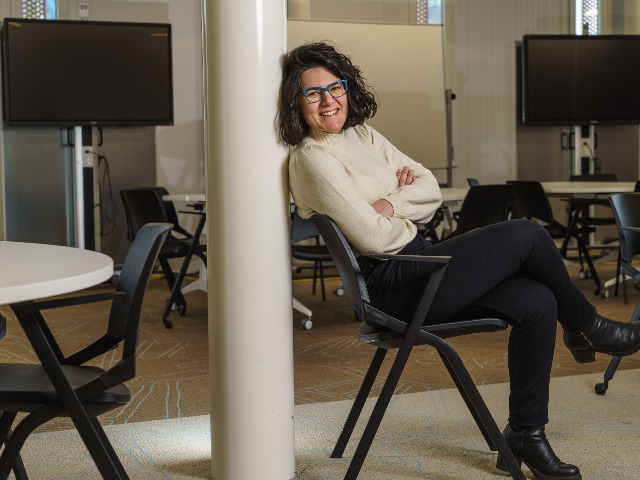Studying the consequences of climate policies for a sustainable and socially equal society
| Date: | 23 July 2024 |

In her research, PhD candidate Carlotta Masciandaro focuses on the distributional consequences of climate policies. At the end of 2023, she received a PhD Grant, for PhD candidates at the University of Groningen working on topics related to sustainable development, from UG’s Rudolf Agricola School. FEB Research talked to Masciandaro about her research and the importance of fighting climate change without worsening societal inequalities.
Can you tell us a little bit about yourself?
“I am Italian, from Rome. I grew up there and then moved to Canada for my last year of high school. Having loved living abroad but wanting to be back in Europe, I decided to start my university career in Amsterdam, where I obtained a BSc in Economics at the University of Amsterdam (UvA). I really enjoyed people’s open-mindedness and appreciated the country for its organization, yet I wanted to move from the chaotic and touristic Amsterdam to a smaller city. Groningen seemed like a great choice, so I moved here for a Research Master and stayed on for a PhD.”
What is the focus of your PhD research?
“In my PhD, I focus on the distributional consequences of climate policies. Previous research has shown that climate policies are a crucial tool in the fight against climate change; that they can ensure its mitigation as well as incentivize adaptation strategies. However, it is often the case that the burden of these policies is not shared equally. For instance, carbon taxes may lead to higher fuel prices, which disproportionately impacts poorer consumers. This raises fairness concerns and may lead to backlash against these policies, which may hinder their implementation. I strongly believe that we should fight climate change and achieve the energy transition without worsening the inequalities that are already burdening our society, which motivates me to assess the effects of climate policies to recommend improvements in their design.”
Up until now, what is the most important finding of your research?
“In my first project, which is now under review, I focused on EU firms in electricity-intensive industries that trade internationally. Due to EU regulation on greenhouse gas emissions (under the EU Emission Trading Scheme), these firms experience higher electricity prices than their competitors in areas that do not regulate emissions in electricity production. This may motivate firms to move production to nonregulated areas, leading to an increase in emissions globally, a process that is termed carbon leakage. To avoid this, some EU countries grant state aid to these firms. My findings suggest that this aid has been effective against carbon leakage, yet I find that about 20% of firms might have received more aid than needed. Also, it was very surprising to find important differences across countries in the effect of the aid measure in question. It is possible that firms located in countries with a history of industrial prominence may have been able to use rent-seeking and regulatory capture, ultimately obtaining more aid than strictly necessary to avoid carbon leakage.”
What could the optimal distribution of state aid look like?
“Granting more aid than necessary means that some of the government resources, raised through taxes, are being misused. These resources could better be used differently, for instance to reduce taxes for lower income households or to provide incentives for green energy production. Ultimately, the optimal design of this aid measure would both reduce inequalities and avoid carbon leakage.”
What are you looking forward to investigating next?
“In my second and current project, I am investigating how households with and without solar panels are differently affected by the net metering scheme (salderingsregeling) in the Netherlands. This scheme incentivizes households to install solar panels, yet it has been strongly debated and is planned to be phased-out by 2030. I analyze how this scheme and the increase in residential solar panels caused by it affect the electricity bills of households. I am very interested in understanding whether households without solar panels, who are usually poorer, are ultimately facing higher costs because of the increased uptake of residential solar panels. I am excited to contribute to the current debate on this scheme and provide some policy recommendations for the future of residential solar energy.”
Rudolf Agricola PhD Grant
A Rudolf Agricola PhD grant enables PhD candidates at the UG to strengthen the relevance and impact of their research output. The grants are awarded thrice a year. Each time, the proposals are evaluated by a jury consisting of members of the Scientific Council of the Rudolf Agricola School. The Rudolf Agricola School for Sustainable Development is the UG’s network organization in the field of sustainable development.
Questions? Please contact Carlotta Masciandaro.

